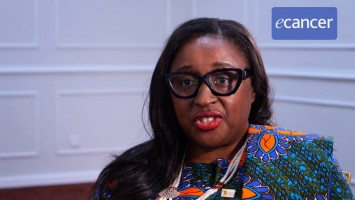World Cancer Leaders’ Summit 2015
Peru's 'Plan Esperanza' and goals in cancer control
Dr Tatiana Vidaurre - Instituto Nacional de Enfermedades Neoplásicas, Lima, Peru
You have a rather amazing thing in Peru, Plan Esperanza, that’s bringing hope in cancer, it’s all about cancer control. What have you done so far?
Plan Esperanza is an unprecedented change in our country for cancer control. We have now a prevention service across the whole country for the different regions in my country but another important thing is we give access to the treatment for the poorest population, by free of charge we increase the affiliation of the public and insurance from 70% to 55% and we decrease out of pocket expenses from 60% to 7% in the poorest population setting.
So the cost of cancer is an important issue, the cost of care, can I ask you first of all about the prevention? What did you do, what have you done so far, in prevention?
In prevention we are running different actions to promote health using different types of strategies like counselling, medical education, patients’ education, we call it ‘Tell me everything about cancer’. For early detection we implement technology to do early diagnosis, including HPV vaccination and molecular oncology tests for preventions. Everything meaning innovation and early detection, promoting healthy lifestyles.
So it’s overall a big package, really. What about the access to treatment because good cancer treatment is a way to keep people alive a lot longer, isn’t it? What have you done there?
This plan is a comprehensive approach. We figured out a way to protect the poor population through public insurance.
But it’s costly, isn’t it? It costs a lot of money.
Yes, but this plan is supported by the government. We have a special fund, that is [?? 2:30] that is protecting by law for the people.
How did you charm the money out of the government, because they have many priorities?
It was a political decision in our country to afford this disease. The main issue is that a kind of badge that is badged [?] by results and we implement this model together with the Ministry of Economics, Ministry of Health and our institute, the National Cancer Institute.
This is a fairly young initiative so far, but do you have any results? Can you say that you’ve been successful up to now?
Yes, we have more than 16 million people with primary prevention intervention. We have more than 2,500,000 people with early detection interventions. We have many educational actions across the country, teaching to different human resources including promotors, community. But the most important that we give access to the treatment, avoid the economic barriers, to more than 100,000 patients with cancer, we give access free of charge to the treatment – chemotherapy, radiotherapy, surgery. The innovation in high technology is huge at the institute, the best technology to access for everybody.
So it seems, from what you’re saying, that Peru is a shining example to the world. What I want to know is how will you be able to export that? You’re here at an international meeting, how can you collaborate in partnership with other countries to do as well in other places?
This National Cancer Control Plan really is the result of a long-term process for doing collaboration with different organisations. We are starting with the US NCI, the American Cancer Society initiative, and then we joined with different platforms in the Global Health Action and Scientific Action networks. That is the way we can learn from each other to try to transfer knowledge, share information, to improve our models in the work.
You sound very optimistic, what is the message you would leave cancer clinicians with in summary?
We have to look for a world free of advanced care cancer and we have to get a comprehensive oncology approach for the population, for the patients and for the families to protect the people.








